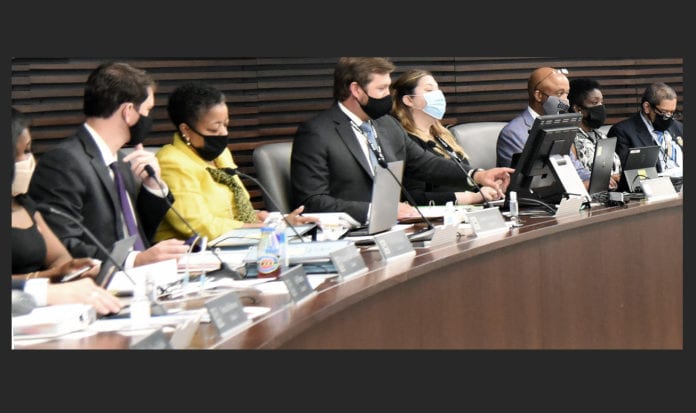by James Coleman —
In regulating pipeline construction in Memphis now is in delay-mode until July in an effort to calm rising tensions between Memphis City Council members and Plains All-American Pipeline over construction of the proposed Byhalia Connection Pipeline.
The delay, which was agreed upon in good faith by Plains All-American, was cemented when the council registered its consent at Tuesday’s regularly scheduled meeting.
And, at an earlier session of the Public Works Committee, council members discussed Councilman JB Smiley Jr.’s proposed ordinance to ban eviction set-outs by homeowners and landlords. That item later drew unanimous support on the first of its three readings.
The proposed pipeline ordinance would essentially ban the controversial Byhalia Connection Pipeline from its projected course over Memphis, as well as similar future projects.
As designed, the Byhalia Pipeline would pass over the Memphis Sand Aquifer, which opponents have argued would endanger the city and region’s main source of fresh drinking water.
It would also pass through historically low-income, African-American communities in South Memphis on its path to Byhalia, Mississippi. That has stirred charges of environmental racism. A legion of opponents has found common cause against the project.
Meanwhile, concerns within the council linger about the broad nature of the ordinance, as well as its constitutionality.
There are other unanswered questions, too. Will it affect existing pipelines? And, what about the sewer system?
Eviction set-outs
“Essentially, what this ordinance does is set a standard that no community will serve as a dumping ground,” said ordinance sponsor Smiley at the committee meeting.
“It should not matter what circumstances you are. It should not matter where you’re coming from. You will not dump trash, you will not dump discarded items on the city’s streets.”
The item would ban dumping of items in bulk capacity curbside on all city streets. It applies to all homeowners and landlords. Multi-family commercial units – such as apartment complexes – contract their waste management. Landlords aren’t supposed to put evicted items out at the curb, although the practice does happen extensively.
Items can range from boxes filled with sundries to furniture, such as couches and mattresses or other large objects.
“This is a problem that exists throughout the whole city,” echoed council member Cheyenne Johnson.
Enforcement of the current ordinance often is problematic because owners can be difficult to track down. Many are likely out-of-state, including commercial entities and LLCs. As a result, communication is difficult.
According to Smiley, the council has made it a priority in recent months to tackle illegal dumping, in addition to designating areas in need of beautification or blight remediation.
“This is just a continuation of what we’ve been discussing … cleaning up the city of Memphis,” he said. “I think we all love the city of Memphis. I think we all have a sense of pride when it comes to Memphis.
“But if we want to restore pride into South Memphis, if we want to restore pride in East Memphis, we must do what I consider essential city services … keeping our communities clean.”
He also said the proposed ordinance doesn’t conflict with state law, declaring that, “If it does, there’s a problem.”


